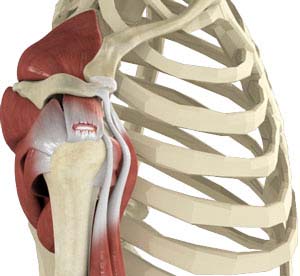
Rotator Cuff Injuries Specialist
Rotator cuff injuries vary in severity and are one of the most common reasons why men and women visit Dr. Flanagin for a consultation. The injury is most commonly seen among men and women who perform repeated overhead movements or sports, such as basketball or golf. The injury tends to worsen with age, and many times will require surgical repair. Brody Flanagin, MD is a rotator cuff injuries specialist in Dallas, Texas. Talk to Dr. Flanagin’s team to know more about the treatment options for rotator cuff injuries.

Rotator Cuff Injuries - Shoulder Pain (DFW, Dallas, Frisco)
About Rotator Cuff Injuries
Rotator cuff injuries vary in severity and are one of the most common reasons why men and women visit Dr. Flanagin for a consultation. The rotator cuff represents a group of tendons and muscles that are intertwined and surround the shoulder joint. Their primary purpose is to keep the head of the upper arm bone secured within the shoulder socket. Most individuals who have a rotator cuff injury often complain of a dull ache that worsens over time, and the injury makes everyday tasks and functions difficult. The injury is most commonly seen among men and women who perform repeated overhead movements or sports, such as basketball or golf. The injury tends to worsen with age, and many times will require surgery for an effective recovery. However, most patients who present with tears in the rotator cuff do not ever describe an injury preceding the onset of their pain. This is termed a “degenerative” tear of the rotator cuff, and represents the most common type of rotator cuff tear that Dr. Flanagin sees in his practice.
Symptoms of a rotator cuff tea
A constant, dull ache is a common symptom of a rotator cuff injury. Most patients will describe the pain as being located along the side of the shoulder or upper arm area. Those suffering from a rotator cuff tear usually have trouble sleeping on the side where the injury exists. They have difficulty doing everyday activities that require lifting the arm above their head such as brushing their hair or reaching for a glass. In addition, normal movements such as scratching your back can sometimes be very difficult to perform. Numbness, overall weakness, and occasional sharp pains can also occur. We will perform specific tests to determine if there is a rotator cuff injury that is causing your shoulder pain and once the injury is diagnosed, a proper treatment plan will be prescribed.
Types of Rotator Cuff Injuries
Rotator cuff injuries can vary in severity, ranging from tendinitis and bursitis, to a partial or a full tear. A large majority of rotator cuff injuries can be treated without surgery. However, if the tear is the result of a true traumatic injury then surgery is commonly recommended. In addition, in the most extreme cases where the tear is irreparable, a tendon transfer or replacement surgery may be recommended.
- Tendinitis/tendinopathy: When the shoulder is exposed to overuse or overload, inflammation can occur within the rotator cuff tendons. This is known as tendinitis.
- Bursitis: When the bursa, which is the fluid-filled sac between the tendons and the shoulder joint, becomes inflamed, bursitis can occur. This is a common symptom of overuse among athletes that partake in overhead activities.
- Rotator cuff tears: Tears can range in severity partial to full-thickness tears. Full-thickness tears can be described as small, medium, large or massive. Ice, rest, and anti-inflammatory medications can typically help treat tendinitis or bursitis, however, if these conditions are not treated appropriately, a larger injury, such as a strain or a tear in the rotator cuff region can occur. Surgery is usually needed when a tear within the rotator cuff occurs that is not improved with the above modalities. This can range from a repair of the torn rotator cuff tendon or, in the event of a massive irreparable tear, a tendon transfer or reverse total shoulder replacement.
Treatment Options
Individuals who are diagnosed with a rotator cuff injury can often recover without having to undergo a surgical procedure. For tendinitis, bursitis, and even some degenerative tears of the rotator cuff, ice, rest, and anti-inflammatory medication, along with specific exercises to improve motion can help heal the injury. Sometimes injections are performed as well depending on the severity of the patient’s symptoms. If surgery is needed, arthroscopic surgery will be used in the overwhelming majority of cases to repair the torn rotator cuff. Some cases involving massive irreparable tears will require a tendon transfer, and in the most severe cases, shoulder replacement surgery may need to be considered. Without the proper treatment, rotator cuff disease can lead to progressive joint degeneration, which can result in continued pain, weakness and dysfunction.
Find Relief Today
Shoulder pain can prevent you from participating in the things you love most in life, but it can also stop you from doing everyday tasks. If you experience constant or worsening shoulder pain, we invite you to contact our orthopedic office today for a full evaluation. Our dedicated team of shoulder specialists will help prepare an accurate diagnosis and an effective treatment plan that will get your arm moving again without pain or worry.
*Individual results are not guaranteed and may vary from person to person. Images may contain models.




